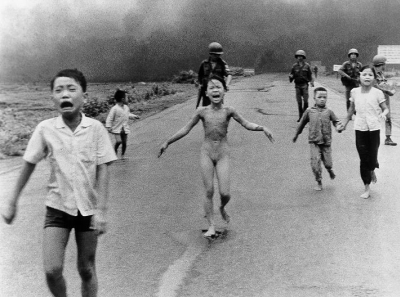Hey,hey, LBJ! How many kids have you killed today?
Mao Tse Tung said “first the mountains, then the countryside, then the cities.” But he left out the fourth: the home front. If you can attack the enemy at their soft under-belly, their home front, using behavioural psychology, stirring up feelings against the immorality of war, then this is a very powerful weapon. The Vietnamese War was the first war that was waged in the lounge, on television.
The Vietcong were very good at exploiting contradictions in the enemy camp. They launched their devastating Tet Offensive at the time of the American election, escalating the human costs of the war. Too many soldiers were being killed, too many were taking drugs, there were too many atrocities, too many massacres. This was no longer an honourable war. The politicians, the commanders and even the soldiers were not highly regarded. The draft of 300,000 young man to fight in Vietnam was already deeply unpopular. There were student revolutions. “Hell no, won’t go!” Even the leaders became disenchanted. Robert McNamara, the Minister of Defence, was one of these. Johnson could not bring himself to run for re-election; he pulled out. This was seen by the Vietcong as a great victory.
The Americans didn’t really understand this war. They were using military solutions to fight a political war; a war of ideologies. They didn’t understand communism. They saw the world as divided, with themselves as the leader of the free world and the Russians as the leader of the enslaved world. Theirs was a mythical conflict, the stuff of romance; the American Crusaders against the Evil Empire; Uncle Sam against the wicked Uncle Ho. Communism was an informed conspiracy of hungry revolutionaries that threatened to engulf all of Asia. There was no question they wouldn’t win it. There had not been a war that the Americans had not actually won with honour. Weren’t they always the good guys, who rode out in the sunset and defeated the evil enemy? Remember the Alamo! Remember their victorious intervention in both European conflicts! And God was on their side in this conflict.
The Americans never tried to expose their enemy’s flaws. The North Vietnamese were committing terrorist acts against their own people all the time but the Americans never really exploited this. And they also created divisions in their own rank, at first supporting Ngo Dinh Diem then they turning against him when he persecuted the monks and sacked the monasteries, so in the end he was assassinated by his own troops. They just failed to understand that that was the way things were done there. Politics never has been a branch of morality, but in the Camelot Court of JF Kennedy, people came to believe it was.
They were shocked to discover that they were seen as the unwanted imperialist invader. When they weren’t trying to destroy the country with bombs they were taking over its infrastructure, its water, its power supplies, its transport. They should have showed more political wisdom, less naivety, less arrogance. They should have never have gone there in the first place. Do these arguments have a familiar ring to them? They should! The war in Iraq, the unwinnable war against terror – had all the same elements.
The Americans were in Vietnam very early. It was Eisenhower, who committed resources to support Diem and the French colonial war that propped him up, picking up 70% of the bill in 1954. But the French were defeated; they committed more and more troops, suffered unacceptable casualties, the war became unpopular in Paris, and they could not win. Why did the Americans not read the runes? Arrogance? Hubris? Paranoia?
So Kennedy pledged to prop the dominos up. Johnson escalated the commitment, claiming this was a war on poverty, a war on ignorance, a war on discrimination, Nixon began to withdraw troops but sent in the bombers. It was left up to Gerald Ford to disengage. But even he tried to get Congress to agree more military aid for Southeast Asia. They refused; one suspects he was relieved.
The Americans realised early on that the war was unwinnable, but they wanted peace with honour. After so much bloodshed, the electorate would not accept the humiliation of defeat and it was political suicide for a president to suggest it. That’s why it went on so long.
The war in Vietnam was the longest in America’s history, and second only to World War II in terms of blood and money. So the American leaders went to war because of paranoia and they failed to end the war because of their political suicide of humiliation.
The Vietnam War was started without a formal declaration and ended with a false peace. It had no clear objective, no obvious moral imperative, no identifiable enemy. America underestimated the task, they never issued a formal declaration of war and mobilisation took place by stealth. Air strikes would never win hearts and minds. The draft was deeply unpopular at home. There were too many gadgets that did not function in the jungle. But there were lessons: helicopters add mobility to jungle warfare; atrocities happen when conditions are wretched and the priority is survival. Amid booby traps, chaos and confusion, conventional moral standards are eclipsed; any Vietnamese, even children, can be seen as the enemy. It’s them or us.
But the war on the home front was being waged between the soldiers, who were just doing their duty and an ever growing corps of politically informed student peace demonstrators (the brutes and the draft dodgers). Besides, Uncle Ho was more of an iconic leader than LBJ, and successive American presidents failed to hang on to the hearts and minds of their own citizens. There were no heroes in this war, no victories, no spoils, just amputees and body bags. .



